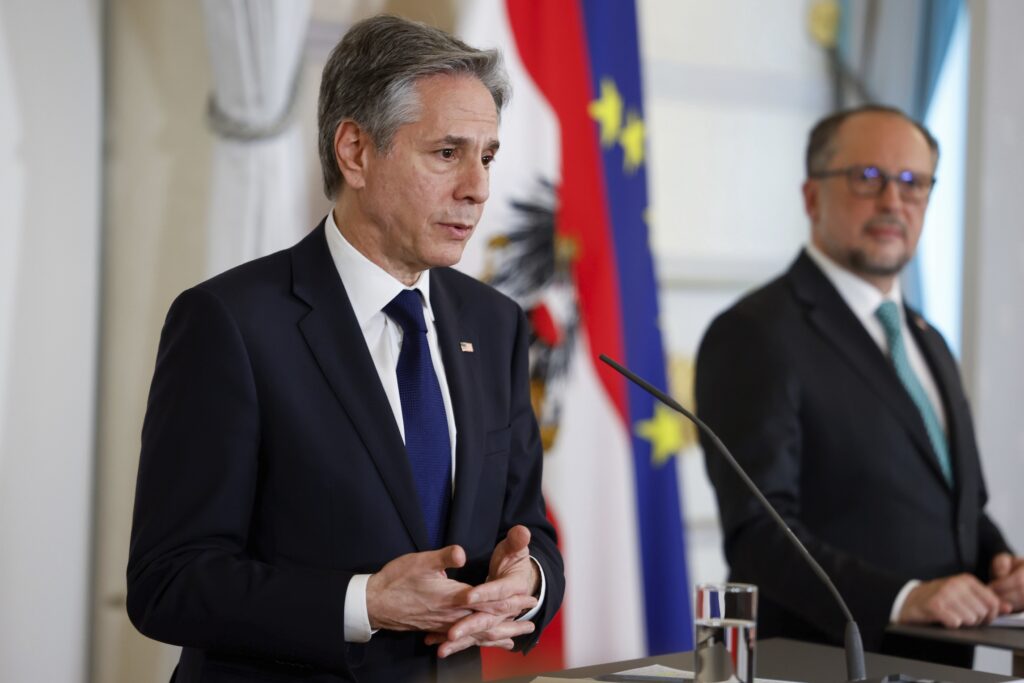U.S. officials are working to finalize a ceasefire deal to release hostages held by Hamas, despite Israel’s rejection of a new proposal from the terrorist organization, according to Secretary of State Antony Blinken.
“There has been a counterproposal put forward by Hamas,” Blinken told reporters in Austria. “We’re working intensively with Israel, with Qatar, with Egypt, to bridge the remaining gaps and to try to reach an agreement.”
Israeli Prime Minister Benjamin Netanyahu told the families of Israeli hostages on Thursday that Hamas has begun to soften their negotiating position under increased pressure from Qatar, which hosts the group’s political leadership. He condemned their ensuing proposal, while also agreeing to continue discussions about a prospective deal.
“I think it reflects the sense both of possibility and of urgency to get an agreement, to get a ceasefire, to get the hostages back, to get even more humanitarian assistance in,” Blinken said. “This is something that we’re committed to, and we will work as long and as hard as it takes to get it done.”

Blinken said earlier this week that Israel had agreed to “a very strong proposal” for a ceasefire deal, but Hamas had not accepted it. Netanyahu said Friday that Hamas’s latest demands “are still absurd,” although he suggested earlier this week that Hamas had begun to buckle under international pressure.
“We are seeing — for the first time — Qatari pressure on Hamas,” Netanyahu said Thursday. “I aspire to this and have been pushing for this for some time. I think that every trip and appearance of yours overseas, at the U.N., in Washington, and in other capitals, has an effect. The Qatari pressure is beginning to work. Qatar has started to tell them: ‘We will throw you out.’ ‘We will deny you funds.’ This is what is being said; we have verified this. This is a change; it is something positive.”
The terrorist group’s counteroffer reportedly involves a three-phase process, which would begin with Israeli forces opening travel corridors to allow the Palestinians to return north. In the second phase, Hamas would begin to release hostages at an approximate ratio of one hostage for 50 Palestinians in Israeli prisons — if Israel agrees to a full halt to the Gaza campaign.
“The complete and permanent ceasefire is the thing that’s not going to happen,” Foundation for Defense of Democracies senior vice president Jonathan Schanzer told the Washington Examiner. “The Israelis might agree to concessions that would benefit Hamas temporarily on the battlefield. … But the idea that they would agree to a permanent ceasefire that would leave Hamas in place? It’s just simply not something that the Israeli public will agree to, regardless of how many hostages are released.”
A breakthrough could come within days, according to one of the intermediary leaders. “We wish within a few days at most to reach a ceasefire and not to have a negative development that could affect the situation,” Egyptian President Abdel Fattah al-Sisi said Friday. “We are talking about reaching a ceasefire in Gaza, meaning a truce, providing the biggest quantity of aid.”
Netanyahu faces internal pressure to finalize a deal, as the relatives of Israeli hostages have staged protests and accused him of failing to prioritize the rescue of their loved ones.
“For the first time, we can envision embracing them again,” the Hostages and Missing Families Forum said Friday in a message to the war cabinet. “Please grant us this right.”
Netanyahu’s war cabinet met Friday to discuss the Hamas proposal, but they “failed to reach an official decision regarding the demands presented by Hamas due to the meeting being scheduled too close to the beginning of Shabbat,” according to the Jerusalem Post.
Netanyahu announced Friday that he had approved a military plan for an assault on Rafah, the southern Gaza Strip city where Hamas battalions maintain their last major redoubt.
“As a rule-of-law state fighting terrorists, it’s a very unequal sort of fight — unequal fight. On the one side you have a terrorist organization, Hamas, not abiding, not respecting any rule, less even humanitarian law,” Austrian Foreign Minister Alexander Schallenberg told reporters during an appearance alongside Blinken. “But Israel has to measure itself by international law. And the decision or the plan, as far as I understand, is — [it] doesn’t mean yet that it will be executed immediately, simply that the prime minister was presented with a plan and that he has given a green light.”
The city’s population has swelled to about 1.4 million people over the last several months as northern Palestinian civilians fled south to seek safe haven from the war.
“The only leverage the Israelis have had in any of this from day one has been their military power,” Schanzer said. “With the Israelis baring their teeth and warning of further incursions into Rafah and finishing off Hamas. This is what makes Hamas want to pause the fighting.”
CLICK HERE TO READ MORE FROM THE WASHINGTON EXAMINER
Blinken paired his update on the negotiating efforts with another warning that Israeli forces must not mount a major offensive in Rafah without a viable plan to mitigate civilian casualties.
“We have to see a clear and implementable plan not only to get civilians out of harm’s way, but also to make sure that, once out of harm’s way, they are appropriately cared for with shelter, with food, with medicine, with clothing,” Blinken said. “And we have not yet seen such a plan.”
